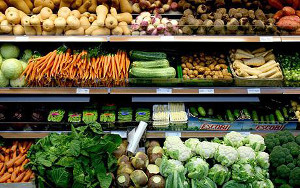 Tyson Foods Inc. tussle for a bigger share of the U.S. processed-food market, BRF SA is stepping up its growth efforts in emerging markets.
Tyson Foods Inc. tussle for a bigger share of the U.S. processed-food market, BRF SA is stepping up its growth efforts in emerging markets.Brazil’s biggest producer of food from chicken cuts to frozen lasagna is looking at acquisitions in the Middle East and is in talks with a prospective partner in China after restructuring operations to boost productivity, Chief Executive Officer Claudio Galeazzi said in an interview in Sao Paulo.
The U.S. is a “cut-throat” market, Galeazzi, who was appointed in August by billionaire Chairman Abilio Diniz with the mission of increasing BRF’s presence overseas, said June 11. “We have many other opportunities elsewhere rather than going there and digesting a very large acquisition.”
Under Galeazzi, BRF has cut thousands of jobs, closed offices and is selling assets to prepare for delivering on growth promises. BRF reviewed Hillshire Brands Co. in February before the Chicago-based company became the subject of a bidding war between JBS’s Pilgrim’s Pride Corp. and Tyson, he said. JBS later pulled out after Tyson offered $7.7 billion.
BRF has spent less than $500 million on acquisitions in Latin America and the Middle East since 2009 compared with JBS’s $14 billion deal spree, according to data compiled by Bloomberg.
New Plant
Instead of big-ticket acquisitions like Hillshire, BRF is considering buying smaller, local food companies in the Middle East, Galeazzi said. BRF completed the $64.9 million purchase of Abu Dhabi-based Federal Foods in April and agreed to buy 40 percent of Al Khan, a Sadia distributor in Oman, for $68.5 million in February. It invested $150 million in a processing plant to be opened by September in the Emirates capital.
Talks announced in December with Kuwait Foods Americana have stalled, he said. The food processor -- which also manages restaurant chains such as KFC, TGI Friday’s and Pizza Hut in the Middle East -- has a market value of $4.1 billion. Americana’s press officials didn’t reply to a request for comment made via the company’s website. Calls to its main switch board made outside of business hours went unanswered.
“New management doesn’t want something that you could swallow but might be difficult to digest,” Galeazzi said. “We’re coming back only if it becomes a reasonably dead chicken,” he said, using a Brazilian expression that means easy target.
As an alternative, BRF is holding conversations with smaller companies with strong brands, processing plants and distribution assets in the region, he said. Products under BRF’s Sadia brand have been sold in the Middle East for more than 40 years and generate annual sales of about $2.2 billion.
‘Quite Dominant’
“We want to shield our Middle East market,” he said. “We’re quite dominant there.”
BRF is also negotiating a joint venture with a “very large company” in China for poultry and hog production, Galeazzi said. “We’re also talking in other regions.”
Galeazzi, who served as the CEO of Pao de Acucar supermarket-chain owner Cia. Brasileira de Distribuicao until 2010, took on his current role four months after Diniz was nominated as BRF’s chairman by pension fund Previ and Tarpon Investimentos SA, which jointly own 23 percent of the company.
The company’s $3.8 billion takeover of Sadia in 2009 led antitrust authorities to demand it cut assets. New management is also seeking to sell assets considered not strategic. In November, BRF announced the sale of beef plants to Minerva SA for 279 million reais ($126 million) in stock. BRF is also willing to sell its dairy unit, which generates about 2 billion reais in sales and “is not the focus of the company,” he said.
‘Overly Bullish’
BRF shares rallied to a record on Sep. 11, a month after Galeazzi's appointment, and have fallen about 11 percent since.
“The market was overly bullish about the change in management,” he said. “It takes time to implement the changes and capture all the synergies.”
Galeazzi has been focusing on building BRF’s cash position, which stands at about 4 billion reais, and return on capital by cutting costs and working capital needs rather then seeking acquisitions.
BRF’s free cash flow per share surged 474 percent in the first quarter, the fastest among the 20 most valuable food companies in the world, according to data compiled by Bloomberg.
“We have been building muscle,” Galeazzi said. “Now we can actually go after” acquisitions.





